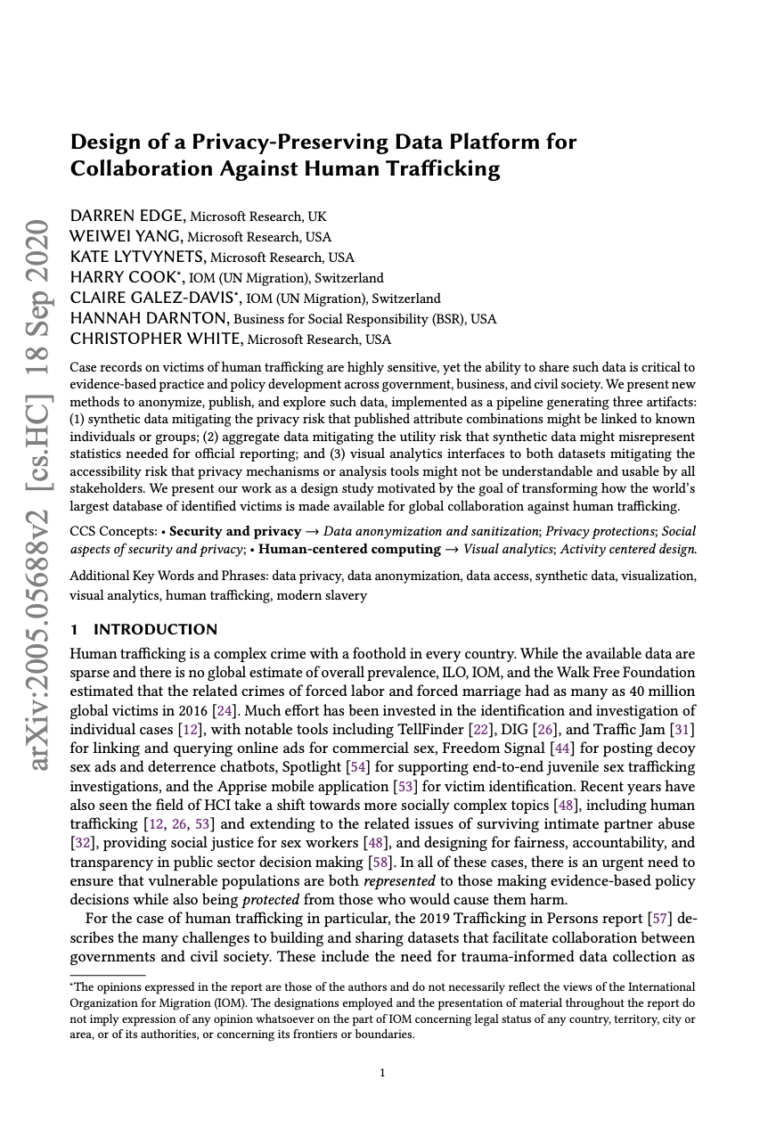Stop Slavery General Manager Handbook
GuidanceThis Handbook is to be used by General Managers in conjunction with the Stop Slavery Blueprint and provides example documents that can be adapted and used accordingly.
Case records on identified victims of human trafficking are highly sensitive, yet the ability to share such data is critical to evidence-based practice and policy development across government, business, and civil society. We propose new methods to anonymize, publish, and explore data on identified victims of trafficking, implemented as a single pipeline producing three data artifacts: synthetic microdata modelled on sensitive case records and released in their place, mitigating the privacy risk that traffickers might link distinctive combinations of attributes in published records to known victims; aggregate data summarizing the precomputed frequencies of all short attribute combinations, mitigating the utility risk that synthetic data might misrepresent statistics needed for official reporting; and visual analytics interfaces for parallel exploration and evaluation of synthetic data representations and sensitive data aggregates, mitigating the accessibility risk that privacy mechanisms or analysis tools might not be understandable or usable by all stakeholders. Central to our mitigation of these risks is the notion of k-synthetic data, which we generate through a distributed machine learning pipeline. k-synthetic data preserves privacy by ensuring that longer combinations of attributes are not rare in the sensitive dataset and thus potentially identifying; it preserves utility by ensuring that shorter combinations of attributes are both present and frequent in the sensitive dataset; and it improves accessibility by being easy to explain and apply. We present our work as a design study motivated by the goal of creating a new privacy-preserving data platform for the Counter-Trafficking Data Collaborative (CTDC), transforming how the world’s largest database of identified victims is made available for global collaboration against human trafficking.

This Handbook is to be used by General Managers in conjunction with the Stop Slavery Blueprint and provides example documents that can be adapted and used accordingly.
This report assesses children’s vulnerability to CSEC across the WB6 and focuses specifically on online sexual exploitation of children and sexual exploitation of children in travel and tourism (SECTT). It also provides an overview of what law enf...Read More
The data in this report represents signals and cases from January 1, 2018 through December 31, 2018 and is accurate as of July 25, 2019. Cases of trafficking may be ongoing or new information may revealed to the National Hotline over time. Consequen...Read More
The data in this report represents signals and cases from January 1, 2018 through December 31, 2018 and is accurate as of July 25, 2019. Cases of trafficking may be ongoing or new information may revealed to the National Hotline over time. Consequen...Read More